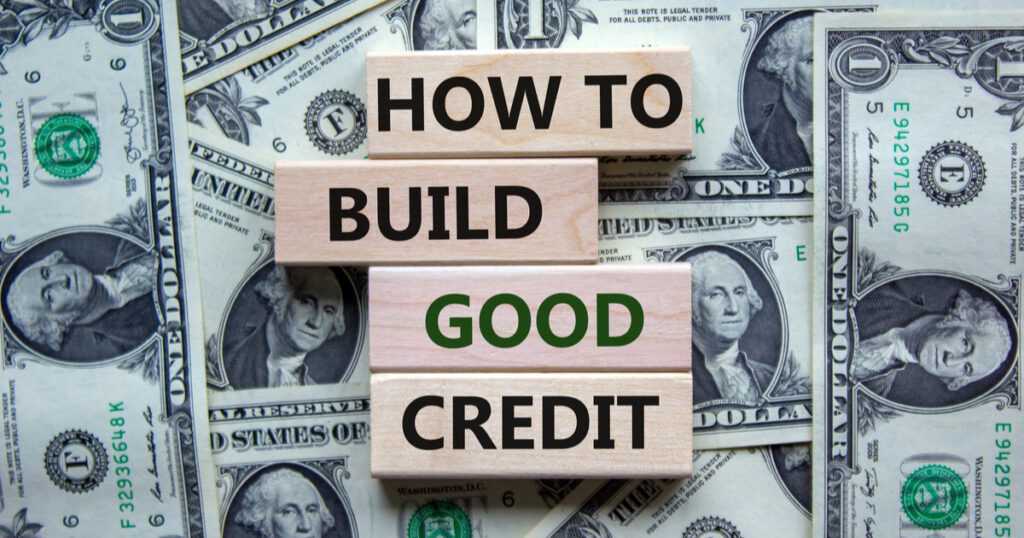
Having a solid credit score when purchasing a home is essential to getting approved for a mortgage. Those consumers that have not established a credit history yet or who have poor credit might find it tough to buy a home without first having good credit. The key is to start early on your credit building journey and follow the tried-and-true credit building principles in order to build your credit before buying a home.
One of the keys to success on how to build your Credit before buying a home is consistency. Building a credit score requires consistent positive financial behavior practiced over a long period of time. Positive financial behavior can be anything from regular moderate usage of credit cards with no splurge spending. It can also mean making regular on time payments on each credit card account, with no late payments – ever. A late credit card payment can be devastating to one’s credit score, and it takes quite a long time for a credit score to recover from a late payment being reported.
When building credit from scratch or re-establishing one’s credit after suffering a negative financial event, we recommend following this general credit plan that should show results for most people trying to establish a positive credit history. There is a caveat for those trying to re-establish credit and who might have a lot of negative credit reporting on their credit report such as Collection accounts. If this is you, most credit experts would recommend talking to a credit repair professional, so you get on the right track in repairing your credit.
We recommend getting 2 – 3 credit cards for those establishing credit and to get these cards over a period of a few months, don’t apply for all of these in the same month all at once. After a few months once those credit accounts are in place, look for a local credit union in your community to work with on getting a small, unsecured personal loan to assist in your credit building journey. The credit cards are a must when establishing credit, but it helps to have some credit diversity on your credit profile to demonstrate you can handle different credit arrangements.
If you are just starting out on your credit building journey, it would be a good idea to look in to a Secured Credit Card if you are starting from a position of little to no credit. Unlike traditional credit cards, secured cards require the cardholder to put down a cash deposit that serves as collateral if the bill is not paid on time. Typically, the deposit amount is also the cardholder’s credit limit, at least at the beginning. Normally, the minimum credit limit is $300 but can go much higher depending on how much the borrower wants to leave on deposit with the card issuer.
One of the most important things to look out for when selecting a secured credit card is to make sure the credit card reports to all three credit bureaus. When establishing a credit history, consumers need to be certain that their credit activity is reported to all three credit bureaus and that is why it is important to only choose a credit card that reports to all three credit bureaus. Make sure to check your credit report half way through this credit building process to be sure that everything is reporting correctly and as it should to all three credit bureaus.
Currently the rate on secured credit cards is about 22% – 24% which is high, but consumers shouldn’t fuss about the rate on the secured credit card if they plan to use the card as they should in order to build their credit. “Remember that the main purpose of obtaining a secured credit card should be to establish or re-establish a positive credit history,” says Stephen Khan, a Phoenix, Arizona based mortgage loan officer. “Card users can do this by using the card for small balance purchases and paying the balance in full every month, and when this is done consistently the interest rate won’t impact you”, says Khan.
That gets in to how consumers should use this card to receive the most benefit to establish or repair their credit? Credit usage as a portion of a borrower’s total available credit is an important factor in shaping one’s credit score. “We recommend that a secured credit card user charge 30% – 40% of their total available credit and pay off the balance in full each month”, says Khan. Do that consistently for twelve straight months and card users will find that the secured credit card does wonders for one’s credit score.
We often get asked if the credit card issuer will convert the secured credit card to an unsecured credit card at any point? Every financial institution and card issuer has their own set of rules and guidelines, but what we find happens is that when a borrower uses their card consistently and makes twelve months of on time payments, the card will convert from a secured credit card to an unsecured credit card and the borrowers deposit money will be refunded or applied to any outstanding balance.
After a year of using the secured credit card, go to annualcreditreport.com and obtain a free copy of your credit report to take a snapshot of your credit to see how you’ve done in building or re-building your credit in the past year.

Recent Comments